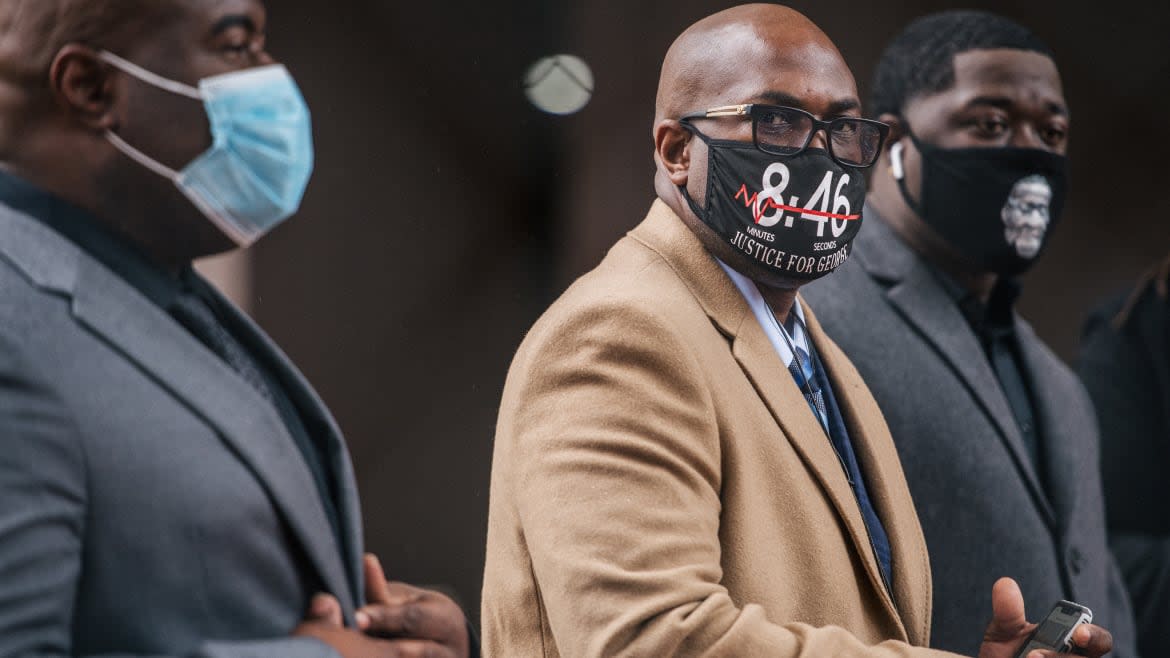George Floyd’s Brother Breaks Down on the Stand: He ‘Was the Leader in Our House’

- Oops!Something went wrong.Please try again later.
George Floyd’s younger brother broke down in tears on the stand Monday as he recalled seeing his sibling for the last time at their mother’s funeral in 2018.
“George just sat there at the casket... He would just say ‘mama, mama,’ over and over again,” Philonise Floyd, 39, told jurors in Hennepin County court on Monday. “And I didn’t know what to tell him, because I was in pain, too. We all were hurting. And he was just kissing her, and just kissing her. He didn’t want to leave the casket.”
Two years later, his older brother died after former Minneapolis police officer Derek Chauvin held his knee on Floyd’s neck for over nine minutes as he pleaded he couldn’t breathe and bystanders begged for mercy.
Chauvin, 45, is now on trial for second and third-degree murder as well as second-degree manslaughter. Three other officers—Tou Thao, Thomas K. Lane, and J. Alexander Kueng—will face trial in August on charges of aiding and abetting second-degree murder while committing a felony, and aiding and abetting second-degree manslaughter with culpable negligence.
Pulmonologist: Chauvin’s Knee on Floyd Was Akin to Having ‘a Lung Removed’
Eric Nelson, Chauvin’s defense lawyer, has argued that Floyd’s death was partially a result of health issues and drugs—and that his client was simply doing what “he was trained to do throughout his 19-year career.” Several current and former Minneapolis police officials, as well as use-of-force experts, all testified on behalf of the government that not only did Chauvin not follow protocol during the May 25 arrest but his actions were “totally unnecessary.”
As one of the final witnesses for the prosecution, Floyd’s brother’s gut-wrenching testimony gave jurors a sense of who Floyd was as a person. Breaking down at times, Philonise said his older brother loved to play Double Dribble on Nintendo and was “the leader in our household”—but a terrible cook.
“He would always make sure that we had our clothes for school,” Philonise said. “He made sure that we all were going to be to school on time. And like I told you, George couldn’t cook. But he will make sure you have a snack or something to get in the morning. But he—he was one of those people in the community that when they had church outside, people would attend church just because he was there. Nobody would go out there until they seen him. And he just was like a person that everybody loved around the community.”
“He just knew how to make people feel better,” he added.
But after their mother died in 2018, Floyd had a hard time moving on, his brother said. Philonise said the “big mama’s boy” shared a special bond with their mother and taught his family to treat her with respect.
That bond was apparent on May 25, when Floyd called out for his mother several times as Chauvin restrained him on the ground outside CupFoods. Over the last two weeks, several bystanders emotionally described to jurors how they repeatedly asked Chauvin to remove his knee and to check Floyd’s pulse during the arrest. Those witnesses included an off-duty Minneapolis firefighter and EMT—who said she was ignored after repeatedly offering her assistance—as well as an MMA fighter who tried to explain that Chauvin’s chokehold was cutting off Floyd’s circulation.
Several teenagers also testified how they begged the officers to stop as Floyd was “gasping for air.”
Chauvin ‘Absolutely’ Violated Policy When He Knelt on Floyd: Police Chief
Hennepin County Medical Examiner Dr. Andrew Baker, who wrote the controversial report on Floyd’s death, testified on Friday that the cops’ restraint “was just more than” Floyd could take. Baker, however, wouldn’t rule out the role of drugs and heart issues in Floyd’s death, providing a small glimmer of hope for Chauvin’s defense team after a devastating week of evidence in which the Minneapolis police chief said the former officer “absolutely” violated protocol, and three renowned medical experts said Floyd died of low oxygen caused by the cops’ actions alone.
Cardiologist Dr. Jonathan Rich on Monday testified that Floyd died of “cardiopulmonary arrest” due low oxygen levels after being restrained. He said that while Floyd suffered from anxiety, substance abuse, and high blood pressure, he had an “exceptionally strong” heart and had no threatening conditions.
“I can say to a high degree of medical certainty that George Floyd did not die from a primary heart event and he did not die from a drug overdose,” he said, later adding that he saw no evidence “to suggest that a fentanyl overdose caused Mr. Floyd’s death.”
“I feel that Mr. Floyd’s death absolutely was preventable,” Rich said.
During cross-examination, Nelson questioned Floyd’s high blood pressure—and whether he thought Floyd would have survived the arrest if he “had simply gotten in the back of the squad car?”
“Had he not been restrained in the way in which he was, I think he would’ve survived that day,” Rich replied.
The Hennepin County Medical Examiner previously concluded Floyd died of cardiac arrest from the restraint and neck compression, also noting that Floyd had heart disease and fentanyl in his system. An independent report commissioned by Floyd’s family, which will not be shown at trial, concluded that he died of strangulation from the pressure to his back and neck. Both reports determined Floyd’s death was a homicide.
Got a tip? Send it to The Daily Beast here
Get our top stories in your inbox every day. Sign up now!
Daily Beast Membership: Beast Inside goes deeper on the stories that matter to you. Learn more.

